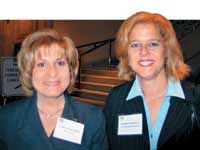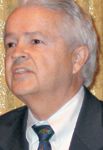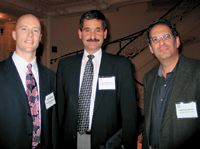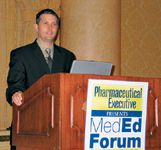Conflict Resolution
Pharmaceutical Executive
"The worst thing in the world that any of us could do would be for one part of our CME enterprise to interfere with either the professional or legal obligations of other parts of the enterprise," Murray Kopelow, chief executive of the Accreditation Council for Continuing Medical Education (ACCME), said in his opening remarks as he addressed an initially antagonistic-if not hostile-crowd on the second day of Pharmaceutical Executive's Second Annual Med Ed Forum last month in Philadelphia.
"The worst thing in the world that any of us could do would be for one part of our CME enterprise to interfere with either the professional or legal obligations of other parts of the enterprise," Murray Kopelow, chief executive of the Accreditation Council for Continuing Medical Education (ACCME), said in his opening remarks as he addressed an initially antagonistic—if not hostile—crowd on the second day of Pharmaceutical Executive's Second Annual Med Ed Forum last month in Philadelphia. Facing an audience of more than 150 medical education providers and pharma company executives waiting for his session, Kopelow did an admirable job of assuaging the audience's distress over an ACCME staff-written Q&A (released a few weeks before the conference) that attempted to clarify stipulations of the organization's newly updated "Standards for Commercial Support (SCS)." At the end of his presentation, even the most belligerent attitudes seemed tamed. The following comments have been excerpted from Kopelow's comments during his formal presentation and the subsequent questions.

Robert W. Doyle, vice-president of marketing operations
"The Q&A The ACCME board of directors charged the staff with the responsibility, and gave us the authority, to interpret and explain its positions in the context of what we knew from the process of developing the SCS. The resource materials were created, I promise you, as educational resources to help bracket the landscape—not as instructions to say, 'Do this and you're going to be OK, and if you don't do these four things you are going to be out of compliance.'
I've tried over the last 10 years not to give specific examples of what a provider should do because the facts and circumstances for each provider are unique. We were asked at this time to take a different role. Resolving conflict of interest is something that we've never asked CME providers to do before. In the educational resources we tried to give examples of what providers could do.

Novartis; Mary L. Lacquaniti, CAE, executive director, Healthcare Marketing and Communications Council, with Susan Torroella, CEO of Columbia MedCom Group
But providers need to understand that those are just educational resources. If they stay on our website or if they disappear, if they get edited or changed, it doesn't mean we are changing policy, and it doesn't mean we are changing accreditation criteria. The decision-making criteria will be established over the next few years, as providers come forward with their approaches to compliance.
We are telling providers that context matters. The context in which they operate—who their audience is, what their educational objective is, what their facts and circumstances are—will dictate their strategy. It's up to the provider to pick strategies to address these issues. It's up to the provider to decide what can be done to ensure that commercial bias is not inserted."

John Kamp, PhD, partner, Wiley Rein & Fielding
"Validity The standards are a key part of ACCME's overall strategy to ensure the credibility and validity of CME. Credibility and validity are, to a great extent, determined by who is in front of the audience teaching. It is important that the best and the brightest are teaching and that CME is independent of commercial interests. Transparency through disclosures is a large part of the credibility of CME.
Most important, of course, is that in order for CME to serve the public's interest, what is taught needs to be true. There is promotional education that is valid and has face validity. But what distinguishes continuing medical education from promotional education is that CME is by and for the profession. The content has been created independently from any commercial interest.

Tom Larrañaga, group publisher of Pharmaceutical Executive magazine, with Steven Mankofsky, strategic account director, Advanstar Medical Economics, and Jerry Silverman, RPh, president of Bimark Medical Communications;
I am not saying that education dependent on commercial interest is wrong, or invalid, or not true. It is just education created by commercial interests and not by the CME system."
"The Big Picture The content or format of a CME activity or its materials must promote improvements or quality in healthcare. That is the most important goal of CME, and we need to focus on that because that is what ACCME's member organizations, the public, and the learners expect."

Andy Bender, principal of Polaris Management Partners
"Mechanism One of the big new issues with these updated standards is resolution of personal conflicts of interest. Here, the most important things to the ACCME are the word 'mechanism' and that providers are engaged in the process of managing, or resolving, conflicts of interest. This has two major components—the identification and the resolution. Resolving conflict of interest means taking steps to ensure that the content of the activity is aligned with the interest of the public. When a relevant financial relationship exists and the content is relevant to that commercial interest, providers must insert safeguards against bias. Providers can, for example, address conflict of interest through managing a person's role or assignment in CME, or through external validation of content. We are moving away from just disclosure of relationships and raising the bar. A disclaimer saying, 'I know this is a biased presentation because I firmly believe it,' is not a standard that we use for managing conflicts of interest. External validation can be accomplished by reference to the scientific literature. There are evidence-based reviews and meta-analyses and syntheses for almost everything that we do as physicians. We need to recognize that quoting the literature, citing four articles that support what is being said, is very different from referencing a meta-analysis or meta-synthesis as the best available evidence. This expectation has been articulated in ACCME's 2002 Content Validation statements.

Eric D. Peterson, MEd, president of the National Alliance of Medical Education and Communications Companies (NAMECC), and vice-president and general manager of Bimark Center for Medical Education.
Another example of external validation is the circumstance where the educational space contains the world's experts. When someone brings new information from his or her own research or offers personal thoughts of what should be done, it is effectively being subjected to a peer-review process because the room contains peers who can judge what they are being asked to learn. They can say, 'this is biased,' 'this is only because of your commercial interest,' or 'the data don't support that conclusion.' That process, that mechanism, resolves conflicts of interest. There are safeguards in place. This is the way professionals and clinical scientists interact, at the expert level."
"Enduring Materials The 1992 SCS said a commercial interest could distribute enduring materials, and the provider was responsible for their use as a CME activity. In element 4.5 of the 2004 Updated SCS, ACCME says providers must not use commercial supporters as a distribution vehicle for a CME activity. The goal of this [SCS] element is to separate detailing from the physician's participation in CME. 'Let's sit down and do this activity together while we are detailing the product,' fails to separate education from promotion. But it's not up to ACCME to say what commercial supporters can buy or do. ACCME does not regulate commercial supporters; they are accountable to other organizations or institutions."
"Timeline Implementing the Updated SCS is a process of change. After May 2005, as providers start new activities, we expect that they will implement the new elements of the Updated SCS. I need to emphasize that there are a limited number of new elements in the 2004 document. We understand that it will take some time, energy, and resources to implement something new, and we expect that providers will have the time to make this transition."
"Demonstrating Compliance The range of strategies and tactics that providers will adopt is yet to be seen; most mechanisms have not yet been described. ACCME has offered some clarification and examples, but ultimately the providers will decide how they will practice. Providers know that ACCME operates under an improvement model. When they are out of compliance, it is their responsibility to come into compliance within a designated period, usually a year. We require that providers demonstrate this improvement in an ACCME Progress Report, a description of current practice accompanied by documentation that verifies compliance. In our experience, 90 percent of providers who are not in compliance can and do demonstrate compliance by the end of one year. Virtually every time, the remaining 10 percent are in compliance after another six months. We know that this improvement model works. We rarely have to take away accreditation, but we do it on occasion."
"Implementation and Enforcement The ACCME considers itself a voluntary, self-regulated system—not a regulatory body. We fundamentally do not believe that enforcement is the major cause of compliance. We believe that we are an organization that articulates the standards that reflect the values of the profession to people who understand the values of the profession. In that context, no enforcement or regulation is required. We do not need to force providers into compliance. When people share your values and they know exactly what the requirements mean, they will implement them. That is the case with the vast majority of accredited providers within the ACCME system."
Special thanks to Andréa Azpeitia, conference producer, for her help with this article.
Addressing Disparities in Psoriasis Trials: Takeda's Strategies for Inclusivity in Clinical Research
April 14th 2025LaShell Robinson, Head of Global Feasibility and Trial Equity at Takeda, speaks about the company's strategies to engage patients in underrepresented populations in its phase III psoriasis trials.
Beyond the Prescription: Pharma's Role in Digital Health Conversations
April 1st 2025Join us for an insightful conversation with Jennifer Harakal, Head of Regulatory Affairs at Canopy Life Sciences, as we unpack the evolving intersection of social media and healthcare decisions. Discover how pharmaceutical companies can navigate regulatory challenges while meaningfully engaging with consumers in digital spaces. Jennifer shares expert strategies for responsible marketing, working with influencers, and creating educational content that bridges the gap between patients and healthcare providers. A must-listen for pharma marketers looking to build trust and compliance in today's social media landscape.
FDA Approves Nipocalimab for the Treatment of Generalized Myasthenia Gravis
April 30th 2025Approval is based on results from the pivotal Vivacity-MG3 trial in which IMAAVY (nipocalimab-aahu) demonstrated superior disease control throughout 24 weeks when compared to placebo plus standard of care.
